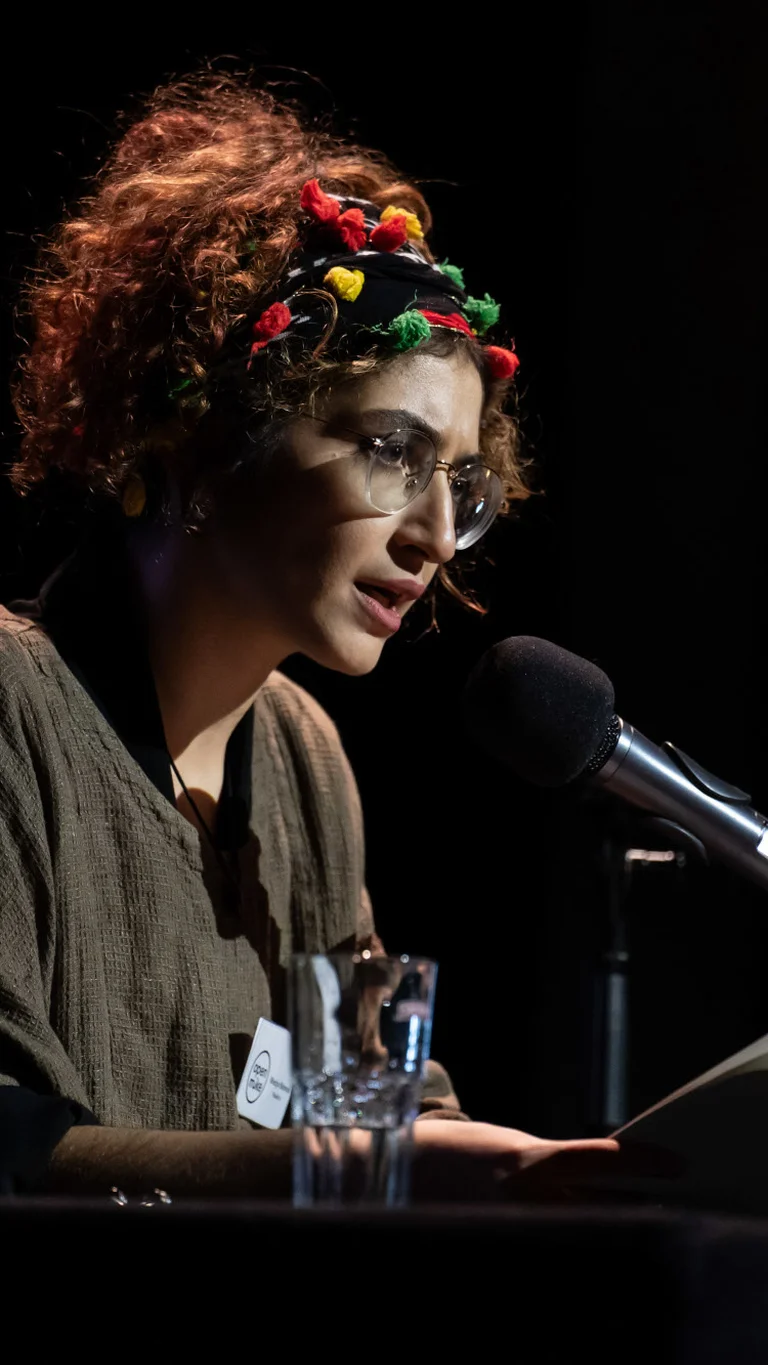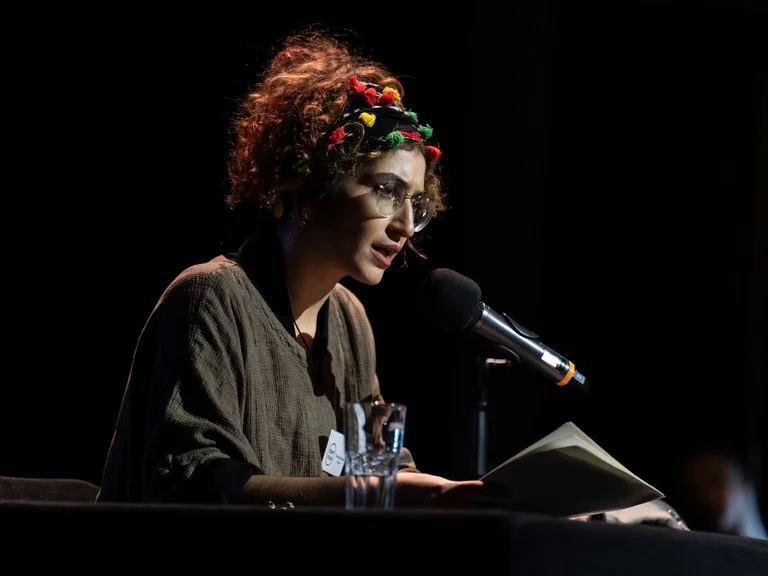
Gen Z, do cry.
Miedya Mahmod
A as in AUSTERITY GAP B as in BROKEN EDUCATION PROMISES C as in CLASS CEILINGS D as in DELULULAND E as in END OF THE LINE F as in FRIENDSHIPS G as in GENOCIDES H as in HOPE? I as in INTERNATIONAL (LONELINESS) J as in JUSTICE:4NELSON:4LORENZ:4MOUHAMED:4QOSAY K as in KRIEGKRIEGKRIEG WARWARWARWAR CLIMATECLIMATECLIMATE CRISISCRISISCRISIS CAPITALCAPITALCAPITAL L as in LOCKDOWN M as in MILITARIZATION N as in NEVER AGAIN O as in OR WHAT? P as in PROTECT TRANS KIDS Q as in QUIET QUITTING IS A BOOMER URBAN LEGEND R as in RACIST ATTACKS COULD FILL FRONT PAGES DAILY BUT DON’T MAKE HEADLINES S as in ‘SENSITIVE’ ISN’T THE INSULT YOU THINK IT IS T as in THERAPY WAITLISTS U as in UHRENCHECK: IT’S NOT 5 TO BUT 50 PAST MIDNIGHT V as in VIRAL W as in WHERE TO? WHAT NOW? WHO EVEN COUNTS HERE? Y as in YALLAH, YALLAH
GEN Z as in
Z for Zag, Zoom, Zero Hour, Zweisprachig, Zoom Fatigue, Zeitlossigkeit, Twenty-something, 2020, 2021, 2022, Two-Household Rule, Trauma Loops, Time-Slip, Zoom In, Zoll, Zoom Out, Zerschleunigung, Zwischenwelt, Z for all the in-betweens
The challenge of our time is not simply to cry (or write) out against the singular, vast silence — but to still hear one another through the deafening noise; to insist on life amidst the flashy infomercial of a death cult.
/
I could write something about how I am part of the first generation since the end of the war that will not ~ have it better than their parents~.
But which end of the war, whose parents?
I could write something about skinny, baggy, low-rise jeans—how my closet used to be filled with neon-colored jeans and dress sizes I should have said goodbye to long ago, but can't seem to. How I like my pants baggy now, meaning Kurdish shalwar. How I, born in 1996, witnessed the rise and fall of the girl boss and am now being fed conservative role models, repackaged as trad wives. How, after #MeToo, like falling dominoes, came the discourse on divine female/male energy.
Everything about this text is cropped—except my curtain bangs.
1996: – depending on which think pieces, marketing reports, or culture podcasts you ask, I am either one of the last millennials or already one of the first representatives of Generation Z. A zillennial—which sounds more like a rare earth metal than a socially relevant positionality. But anyway. As I am writing, I feel – for the first time – like I’m actually taking a job away from old white men™ and the boomer women who are well established in their circumstances. Texts about generations tend to be written about them, never with them, and rarely by them. I don’t even complain about the latter, because I’ve seen too many millennial bloggers and podcasters make absolutely despicable appropriations of entire birth cohorts for the sake of clicks, rage, and book deals.
First of all: the term “Gen Z” is not a neutral sociological category, but a product with a history—and that history is closely interwoven with marketing, consumer logic, and the need to break people down into clearly definable target groups. In addition to being definable, target groups must have one thing above all else in order to be “discovered” as a target group: monetary potential. In other words: the ability to spend money, or to bring money to others.
Gen Z is often described as “woke” and socially progressive. That’s partly true—especially when you look at the visibility of young activists. But the media focus distorts the picture: for every viral climate protest video, there are countless young people who show little interest in politics, because politics has little to offer them—or because they themselves hold reactionary views.
This isn’t a criticism, but a sign that the concept of “generations” is too broad. It obscures social differences: those who grow up in a well-off urban environment have completely different opportunities and access than someone from a precarious, rural household—even if both were born in the same year. Those who start school with a history of displacement face entirely different prejudices and hurdles than children whose childhood has not yet been tested, and above all, not questioned from the moment they grow their first beard.
A group that, in my perception, particularly enjoys writing about Gen Z and complaining about their work ethic are employers—or those who profit from others’ labor, also known as employees. As a freelance writer, I don’t even have the option of quiet quitting. Who would I quit—my landlord? My statutory health insurance? Probably not.
I don’t want to write about my ability to work today either. I have a 40% disability rating and, like many of my classmates, I burned out under the magnifying glass of the academic system. Since the age of 18, I’ve been making a living with gigs and performances—basically, the gig economy. Just a slightly more romanticized version of self-exploitation, because it happens to be in the cultural sector. So brave. Great.
I want to take a step back—retrospectively, not regressively. In the early 20th century, sociologists like Karl Mannheim tried to describe the concept of “generational storage”—the idea that people born within a certain period are shaped by similar historical events. At first glance, that sounds plausible—after all, the Great Depression and the fall of the Berlin Wall did shape entire generations.
With analytical sharpness, this could even be a fruitful exercise—to critically examine generational conflicts and worldviews. But instead of nuanced milieu studies in discourse spaces and overly serious feature articles, I mostly read simple labels: Boomers, Gen X, Millennials, Gen Z, Alpha Kids. The timeframes are arbitrary, the geographical contexts rarely mentioned, and the observations and supposed characteristics are reduced to clichés. Generational labels thus become a kind of modern astrology: entertaining, sometimes enlightening, but often far too crude to do justice to reality.
Don’t get me wrong—it was a defining moment in my life when I learned in 2015 that I’m not a Libra at all, but a Scorpio, albeit with Libra rising and a Pisces moon.
Still, I must point out that while my reality is shaped by the signs of the times, the way they shape me is also tied to my class, my physical disability, my name, my background and foreground, my socialization as a female-read person of non-binary gender, and my experiences of discrimination as a Kurdish person and child of two migrants—who could, in theory, quiet quit their systemically important jobs, but unlike me, never take sick leave because they’ve learned they are here to work. Nothing more, nothing less.
My little brother, born in 2002 and thus also Gen Z, ticks completely differently than I do. While I see the world being destroyed by capitalism and neoliberalism—and therefore don’t want to participate—he, socialized as male and equipped with the appropriate hustle playlists from Spotify, is still convinced he can make it.
One of my earliest memories of the world dates just before he was born, in 2001. 9/11, and I’m sitting in a circle of chairs in kindergarten—which isn’t followed by a similar circle a year later when the US invades Iraq, the country my parents come from, complicating our summer vacation plans. The next time we fly down, it’s via Damascus and then by car. Ten years later, I’ll be standing at the Turkish-Iraqi border, watching and hearing military planes swoop low above as I drive back to Germany alone with my father. Baba says: it’s definitely the Russians. Baba says: Syria.
Before that: the financial crisis and bank bailouts. “It’s a girl!” and she’ll remain my chancellor throughout my entire youth. “We are Pope!” and the normalization of German flags everywhere, even though garden plots and balconies are not federal institutions.
After that: a brief summer of “Refugees Welcome”, an eternal winter in the cold country. The ongoing decimation of biodiversity. The final fall of every mask that wasn’t first put on during a multi-year global pandemic, one with which Western nations assert their superiority—not the first since xy—but a new, young war in Europe that has now gone on for years.
Ukraine, Sudan, Congo, Palestine, and again and again: economic interests, complicity, militaristic posturing, which translates to military spending. Money for arms and war instead of education, affordable housing, healthcare, and a culture of construction rather than destruction.
Gen Z, how do you feel about conscription?
Gen Z, where are your global friends in the epidemic of loneliness?
Gen Z, no welfare state will catch you when you fall.
If I have one wish for my generation, it’s that those who fight for life have staying power. That those who work to maintain safe spaces—and know how urgent that is—also find spaces to rest. That these struggles connect across generations. As someone who experienced both an analog childhood and a digital youth, I often feel a strange tension. On the one hand, I feel nostalgia for a time when communication was slower and less surveilled. On the other hand, I know that my generation benefits from digital connectivity—through access to knowledge, creative self-expression, and political mobilization.
But the flip side is a permanent feeling of insecurity: climate crisis, economic instability, algorithmic control. The pressure to constantly reinvent yourself to remain relevant is enormous—and it’s often romanticized as “flexibility.” Personal responsibility. DIY culture. Hustle, just hustle.
Gen Z, do cry. Gen Z, get some sleep. Gen Z, be ready.
Harder times are coming, and there is no weakness in wanting to stay soft.
Gen Z, organize. Gen Z, disobey. Gen Z, don’t become your parents, please.
xx one of u
About the author
Born and raised in the Ruhr area, Miedya Mahmod has been working with paper and stage poetry since 2016, writing short prose, long poems and everything in between. They is part of the post-German collective parallelgesellschaft. They is co-editor of LytterZine, the first illustrated poetry magazine on Twitter (RIP) created by and for users, and has participated in the first German-language spoken word poetry retreat at the Hausacher LeseLenz literature festival. In 2024, Mahmod was represented by an installation in the KÖRPER:SPRACHEN exhibition at Burg Hülshoff and was the Centre for Literature's house artist. Having narrowly missed out on a place in this year's Ingeborg Bachmann Competition, they were recently awarded the Ruhr Literature Prize.
